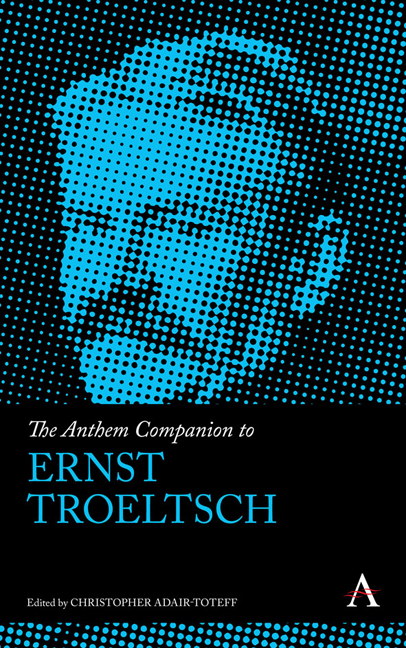Book contents
- Frontmatter
- Contents
- Introduction Ernst Troeltsch: Theologian, Sociologist, Philosopher, and Culture Critic
- Chapter One The Independence of Religious Phenomena: The Work of Ernst Troeltsch as a Template for the Study of Religion
- Chapter Two Troeltsch on Protestantism and Modernity
- Chapter Three Church, Sect, Mysticism: Writing the History of Christianity
- Chapter Four Troeltsch's Personalism
- Chapter Five Performative Practice: Ernst Troeltsch's Concept(s) of Christianity
- Chapter Six Troeltsch and the Problem of Theological Normativity
- Chapter Seven Troeltsch as Dogmatic Theologian
- Chapter Eight Ernst Troeltsch and the Problem of Historicism
- List of Contributors
- Index
Chapter Six - Troeltsch and the Problem of Theological Normativity
Published online by Cambridge University Press: 10 May 2018
- Frontmatter
- Contents
- Introduction Ernst Troeltsch: Theologian, Sociologist, Philosopher, and Culture Critic
- Chapter One The Independence of Religious Phenomena: The Work of Ernst Troeltsch as a Template for the Study of Religion
- Chapter Two Troeltsch on Protestantism and Modernity
- Chapter Three Church, Sect, Mysticism: Writing the History of Christianity
- Chapter Four Troeltsch's Personalism
- Chapter Five Performative Practice: Ernst Troeltsch's Concept(s) of Christianity
- Chapter Six Troeltsch and the Problem of Theological Normativity
- Chapter Seven Troeltsch as Dogmatic Theologian
- Chapter Eight Ernst Troeltsch and the Problem of Historicism
- List of Contributors
- Index
Summary
The salient problem raised by religious pluralism is the serious extent to which it challenges or, as some would claim, undermines the very possibility of strong normative claims for religious faith and practice. The core problem is one of authority: how can an ostensible norm— for instance, “God was in Christ reconciling the world to Godself,” which orthodox Christians affirm as a historical and normative claim, in many instances a universal normative claim— exercise normative authority when the range of that authority is limited by the competing claims of other religions or within Christianity itself by deflationary interpretations of that norm itself? Relatedly, how can one justify more than an attenuated claim of normative authority, even though a weaker claim might be insufficient for underwriting and structuring religious life? Ernst Troeltsch's entire career was a deeply thoughtful and honest effort to solve this problem in light of a conclusion that he found to be inescapable, namely, that all religious normativity and thus normative theological claims are radically historically conditioned. The degree to which he was, if at all, successful is controversial, but Troeltsch doubtlessly saw the problem perhaps more perspicuously than any theologian before or since.
For Troeltsch, the singular question in theology is the issue of theological normativity. Early in The Absoluteness of Christianity he writes: “What theology is concerned with is not the history of religion in general but normative knowledge acquired through the scientific study of religion. Only this can have meaning for theology.” Accordingly, theology has two central and related tasks: (1) derive this normativity from a study of the history of religion, and (2) give Christian thought a “form that will correspond to the present religious and intellectual situation.” This makes for a complex and rather daunting task, since one must justify not only a claim of historical knowledge— that “F is the essence or master norm for X,” where X is taken as any historical religion— but also a strong normative claim— that “F is, ought to be, and will continue to be the master norm for X,” to say nothing of the exclusivist normative claim that “F is normative for any and all religious beliefs and practices.” From historical research one must derive norms and justify their claim for universal authority, and one must do so within the normative restraints of historical research.
- Type
- Chapter
- Information
- The Anthem Companion to Ernst Troeltsch , pp. 105 - 126Publisher: Anthem PressPrint publication year: 2017

